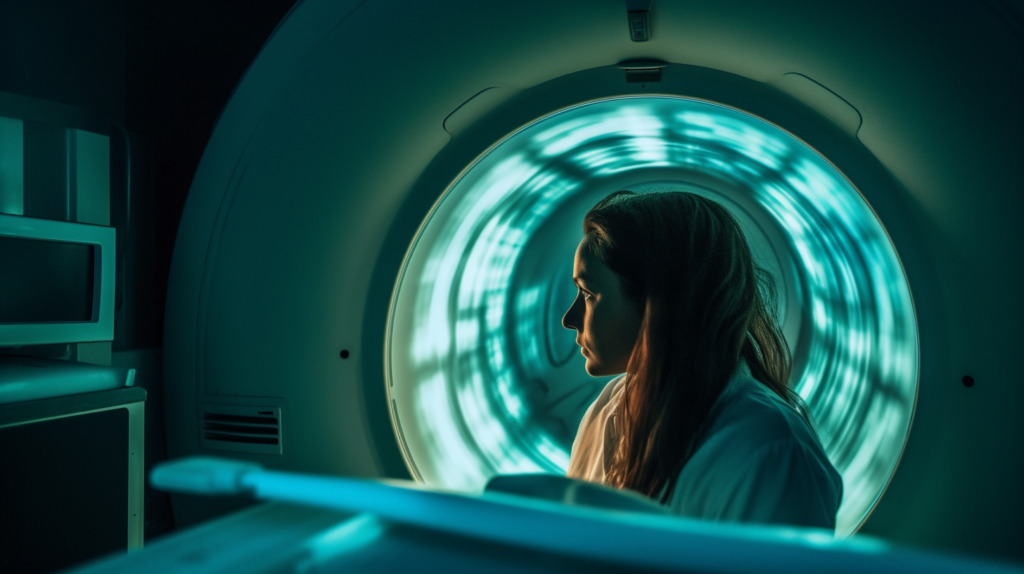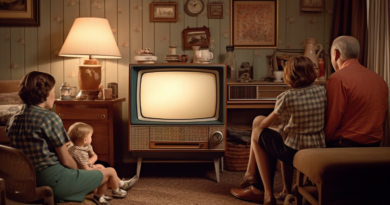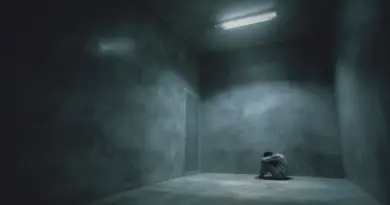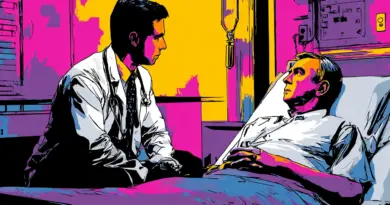Vídeo | What is overdiagnosis?
Assista a este vídeo informativo e aprofunde-se no conceito de overdiagnosis, ou diagnóstico exagerado, uma realidade médica complexa e crucial. Com exemplos claros e uma narrativa precisa, o vídeo desvenda as diferenças entre diagnóstico exagerado (overdiagnosis) e diagnóstico incorreto (misdiagnosis), destacando as implicações sérias de diagnósticos desnecessários. Conheça as nuances dos exames de rastreio e descubra como tomar decisões informadas para sua saúde. Este vídeo é uma ferramenta essencial para quem busca compreender os desafios do cenário médico atual e fazer escolhas conscientes.
| Audio | |
|---|---|
Normal | Slow |
| English Transcript | Tradução |
| Overdiagnosis - what does overdiagnosis actually mean? | Overdiagnóstico - o que significa exatamente overdiagnóstico? |
| Is it like misdiagnosis? | É como um diagnóstico errado? |
| Not really. | Não exatamente. |
| Misdiagnosis is a wrong diagnosis: For instance, if someone is diagnosed with cancer, but they actually have a benign cyst. | Diagnóstico errado é um diagnóstico incorreto: Por exemplo, se alguém é diagnosticado com câncer, mas na verdade tem um cisto benigno. |
| Overdiagnosis is, in fact, a correct diagnosis. | Overdiagnóstico é, de fato, um diagnóstico correto. |
| But the medical condition that was diagnosed would never have caused any symptoms or problems. | Mas a condição médica diagnosticada nunca teria causado sintomas ou problemas. |
| In other words, this kind of diagnosis is unnecessary. | Em outras palavras, este tipo de diagnóstico é desnecessário. |
| Take Mr. Williams, for example. | Pegue o Sr. Williams, por exemplo. |
| He gets prostate cancer at the age of 65, but doesn't have any symptoms because the tumour hardly grows. | Ele tem câncer de próstata aos 65 anos, mas não apresenta sintomas porque o tumor cresce muito lentamente. |
| He dies of a heart attack at the age of 77, without ever knowing that he had cancer. | Ele morre de um ataque cardíaco aos 77 anos, sem nunca saber que teve câncer. |
| If he had been screened for prostate cancer when he was 65, he would have been diagnosed with cancer and possibly had surgery, radiotherapy and years of emotional stress. | Se ele tivesse feito exames para câncer de próstata aos 65 anos, teria sido diagnosticado com câncer e possivelmente passado por cirurgia, radioterapia e anos de estresse emocional. |
| But he wouldn't have lived longer as a result. | Mas ele não teria vivido mais por causa disso. |
| That's what's meant by over diagnosis. | É isso que é chamado de overdiagnóstico. |
| And the treatment that follows is called overtreatment. | E o tratamento que se segue é chamado de supertratamento. |
| Because it wouldn't have been necessary either. | Porque também não teria sido necessário. |
| But how can that be? | Mas como isso é possível? |
| Isn't cancer always dangerous? | O câncer não é sempre perigoso? |
| Nowadays we know that different kinds of cancer behave differently. | Hoje sabemos que diferentes tipos de câncer se comportam de maneira diferente. |
| But no one can predict whether or how a tumour will progress. | Mas ninguém pode prever se ou como um tumor progredirá. |
| All tumours start off small and go unnoticed at first. | Todos os tumores começam pequenos e passam despercebidos inicialmente. |
| Some grow faster and become life-threatening. | Alguns crescem mais rápido e se tornam ameaças à vida. |
| Discovering this kind of tumour at an early stage can save lives. | Descobrir esse tipo de tumor em um estágio inicial pode salvar vidas. |
| Others don't, or hardly, grow and don't cause any problems. | Outros não crescem, ou crescem muito lentamente, e não causam problemas. |
| If these tumours are discovered through screening it's considered to be overdiagnosis. | Se estes tumores são descobertos através de exames, é considerado um overdiagnóstico. |
| So what does that mean? | Então o que isso significa? |
| That you should stop going to the doctor? | Que você deve parar de ir ao médico? |
| That screening is pointless or you shouldn't have treatment? | Que os exames são inúteis ou você não deve se tratar? |
| No, of course not. | Não, claro que não. |
| But it's a good idea to find out about the pros and cons of a screening test before doing it. | Mas é uma boa ideia se informar sobre os prós e contras de um exame antes de fazê-lo. |
| Let's take a look at another example: breast cancer. | Vamos olhar para outro exemplo: câncer de mama. |
| If 1,000 women between the ages of 50 and 69 have mammograms every two years, two to six deaths from breast cancer are prevented thanks to screening. | Se 1.000 mulheres entre 50 e 69 anos fizerem mamografias a cada dois anos, duas a seis mortes por câncer de mama são evitadas graças ao exame. |
| But screening also leads to overdiagnosis in 9 to 12 of the women which often leads to unnecessary and stressful treatments. | Mas o exame também leva ao overdiagnóstico em 9 a 12 das mulheres, o que frequentemente leva a tratamentos desnecessários e estressantes. |
| In other words: screening can improve the chances of recovery, but it can also be harmful if it leads to the discovery of cancer that would never have caused any problems. | Em outras palavras: exames podem melhorar as chances de recuperação, mas também podem ser prejudiciais se levarem à descoberta de um câncer que nunca teria causado problemas. |
| So what can you do? | Então, o que você pode fazer? |
| Choose the option that best suits you. | Escolha a opção que melhor se adapte a você. |
| Would you rather have regular screening tests even if that means risking overdiagnosis - with all the physical and psychological consequences? | Você prefere fazer exames regulares mesmo que isso signifique arriscar um overdiagnóstico - com todas as consequências físicas e psicológicas? |
| Or would you prefer to avoid unnecessary diagnoses and treatments even if that means that a serious illness might only be discovered at a later stage, when treatment may be less effective? | Ou prefere evitar diagnósticos e tratamentos desnecessários, mesmo que isso signifique que uma doença grave só seja descoberta em um estágio mais avançado, quando o tratamento pode ser menos eficaz? |
| Many people find it hard to make this kind of decision. | Muitas pessoas acham difícil tomar esse tipo de decisão. |
| It's important to carefully consider the pros and cons. | É importante considerar cuidadosamente os prós e contras. |
| Talk things over with the people you're close to and don't hesitate to ask other doctors about the potential advantages and disadvantages of the screening test. | Converse com pessoas próximas e não hesite em perguntar a outros médicos sobre as potenciais vantagens e desvantagens do exame. |
| For more information on this topic go to informedhealth.org | Para mais informações sobre este tópico, visite informedhealth.org. |
Contagem de palavras
A tabela abaixo exibe as palavras encontradas neste vídeo, bem como o número de vezes em que aparecem.
Veja também: Para que serve esta tabela?
| Freq. | Palavra | Freq. | Palavra | Freq. | Palavra |
|---|---|---|---|---|---|
| 17 | the | 15 | to | 15 | of |
| 14 | that | 14 | and | 13 | is |
| 11 | a | 10 | not | 10 | have |
| 10 | cancer | 9 | it | 9 | but |
| 8 | screening | 7 | you | 7 | would |
| 7 | if | 7 | he | 6 | overdiagnosis |
| 6 | can | 6 | at | 5 | or |
| 5 | be | 4 | with | 4 | what |
| 4 | this | 4 | in | 4 | for |
| 4 | do | 4 | diagnosis | 4 | any |
| 3 | unnecessary | 3 | tumour | 3 | treatment |
| 3 | problems | 3 | other | 3 | leads |
| 3 | kind | 3 | had | 3 | does |
| 3 | diagnosed | 3 | been | 3 | are |
| 2 | years | 2 | words | 2 | women |
| 2 | when | 2 | was | 2 | two |
| 2 | tumours | 2 | treatments | 2 | test |
| 2 | take | 2 | symptoms | 2 | stage |
| 2 | so | 2 | should | 2 | prostate |
| 2 | pros | 2 | people | 2 | over |
| 2 | no | 2 | never | 2 | misdiagnosis |
| 2 | means | 2 | mean | 2 | how |
| 2 | hardly | 2 | grow | 2 | go |
| 2 | find | 2 | example | 2 | even |
| 2 | discovered | 2 | cons | 2 | caused |
| 2 | breast | 2 | because | 2 | also |
| 2 | all | 2 | age | 2 | actually |
| 2 | about | 1 | wrong | 1 | without |
| 1 | williams | 1 | will | 1 | which |
| 1 | whether | 1 | we | 1 | us |
| 1 | unnoticed | 1 | topic | 1 | through |
| 1 | threatening | 1 | things | 1 | they |
| 1 | these | 1 | thanks | 1 | tests |
| 1 | talk | 1 | surgery | 1 | suits |
| 1 | stressful | 1 | stress | 1 | stop |
| 1 | start | 1 | someone | 1 | some |
| 1 | small | 1 | six | 1 | serious |
| 1 | screened | 1 | save | 1 | risking |
| 1 | result | 1 | regular | 1 | recovery |
| 1 | really | 1 | rather | 1 | radiotherapy |
| 1 | psychological | 1 | progress | 1 | prevented |
| 1 | prefer | 1 | predict | 1 | potential |
| 1 | possibly | 1 | pointless | 1 | physical |
| 1 | overtreatment | 1 | out | 1 | others |
| 1 | org | 1 | option | 1 | only |
| 1 | one | 1 | on | 1 | often |
| 1 | off | 1 | nowadays | 1 | necessary |
| 1 | mr | 1 | more | 1 | might |
| 1 | medical | 1 | meant | 1 | may |
| 1 | many | 1 | mammograms | 1 | make |
| 1 | look | 1 | longer | 1 | lives |
| 1 | lived | 1 | like | 1 | life |
| 1 | let | 1 | less | 1 | later |
| 1 | knowing | 1 | know | 1 | kinds |
| 1 | instance | 1 | informedhealth | 1 | information |
| 1 | improve | 1 | important | 1 | illness |
| 1 | idea | 1 | hesitate | 1 | heart |
| 1 | harmful | 1 | hard | 1 | grows |
| 1 | good | 1 | going | 1 | gets |
| 1 | from | 1 | follows | 1 | first |
| 1 | faster | 1 | fact | 1 | every |
| 1 | ever | 1 | emotional | 1 | either |
| 1 | effective | 1 | early | 1 | doing |
| 1 | doctors | 1 | doctor | 1 | discovery |
| 1 | discovering | 1 | disadvantages | 1 | differently |
| 1 | different | 1 | dies | 1 | diagnoses |
| 1 | decision | 1 | deaths | 1 | dangerous |
| 1 | cyst | 1 | course | 1 | correct |
| 1 | considered | 1 | consider | 1 | consequences |
| 1 | condition | 1 | close | 1 | choose |
| 1 | chances | 1 | cause | 1 | carefully |
| 1 | called | 1 | by | 1 | between |
| 1 | best | 1 | benign | 1 | behave |
| 1 | before | 1 | become | 1 | avoid |
| 1 | attack | 1 | ask | 1 | as |
| 1 | another | 1 | an | 1 | always |
| 1 | ages | 1 | advantages |









